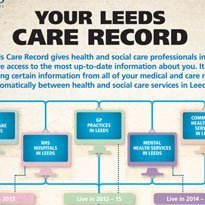Leeds shared record suppliers named
- 30 June 2014

A shared care record and improved information governance protocols are key parts of a pioneering project for integrated care in Leeds, those behind the initiative have said.
The Leeds integrated care initiative was one of the projects discussed at the Health + Care conference in London.
Leeds is one of 14 integration pioneer sites chosen by the Department of Health to lead the way on integrating health and social care through shared care records and other uses of technology.
Sandie Keene, Leeds City Council's director of adult social services, told the conference that technology and IT is one of the main aspects of the integration project.
“We developed three strands, and the first was around innovation because we wanted to create innovative methods around technology and IT.”
Diane Boyne, commissioning lead for community services and continuing care at NHS Leeds South and East CCG, said a key project for the group is the Leeds Care Record.
The record is a fully integrated, shared record across primary care, integrated care services and acute NHS trusts in the city to provide patients and clinicians with a single source of information about their care.
“We want to make sure that not only the patient has a single story to tell, but the practitioners can all share a single story as well.”
Healthcare Gateway announced last week that its Medical Interoperability Gateway has been chosen as part of the shared record project.
In the first phase of its implementation, patient records held by 109 GP practices using both Emis and TPP systems will be linked using the MIG.
Leeds Teaching Hospitals NHS Trust has developed an open source portal that links the trust’s systems into a single view. Information from the portal will be used within the Leeds Shared Care Record.
The trust has also signed a contract with InterSystems for its HealthShare platform and its regional master patient index, which is used to identify patients in different systems across the region.
The trust also uses HealthShare’s spine mini services to access patient demographics on the Spine.
Meanwhile, Boyne told the conference the project is using PI's CareTrak system to track the adult social care experience of the city's population.
The system collects data from the city's health and social care systems and GP records about a patient's care visits, the frequency of hospital admissions and other information to allow the group to see whether a change in a patient's care has made a difference to their health outcomes.
“As the information becomes more rich, we'll be looking back in the past to see what things we've done that made a difference,” Boyne said.
Keene said the group is also working on its information governance protocols to ensure information is shared where possible, with the ultimate goal of establishing a platform for information which is “patient or person-held”.
“We believe there are masses of savings to be made through clarifying, simplifying and challenging the information governance processes.”
She said the site is also leading a national pioneer collaborative project on informatics, with the goal of finding solutions to common barriers to greater use of informatics across the country.




